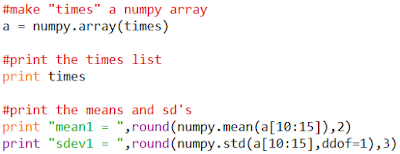Every week or so in my new teaching job I have to time students one by one as they write strings of symbols. The way it's usually done is with a stopwatch, and the student pauses to write down the time for each of the 25 trials. Since I was looking at testing all my students this week, I wondered if I could write a Python program that would help.
This summer I worked at a camp introducing Python programming using Pygame and I've been keeping up my skills. Many of the programs involve interaction with the keyboard or mouse and I woke up this morning with an idea to write a stopwatch program using the space bar. I fired up the Pygame template I adapted from Professor Craven of Simpson College. First I had to create a list to store all the times, and create a variable to tell when the program is timing or not.
Then I just added to the usual key-events code where Pygame checks if the user clicked to exit the program or pressed a key. Here's the code for "if the space key is pressed and if you're not timing, record the present time and start timing (and print "timing" in the shell so I'll know)."
But if the program is already timing, record the present time, calculate the elapsed time, and add that to the times list. If the times list is 25 items long, stop the program.
I like that last line. Whenever the space bar is clicked, it toggles between timing and not timing.
Here Comes Numpy
The tedious part is calculating the means and standard deviations of 3 blocks of times. Most teachers type the numbers into a web page, but since we've already got the times in a list I knew it would be child's play to get the means and standard deviations. All I needed to do was to make the times into a Numpy array and use the "mean" and "std" functions.
Here's what the final result looked like.
The students were impressed I could produce their results so quickly!




